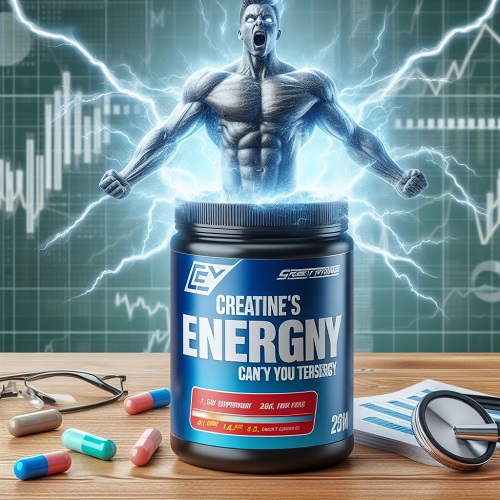Does taking creatine give you more energy?
Yes, creatine can give you energy, but it’s important to understand how it works differently from stimulants like caffeine. Here’s what research tells us:
- Cellular Level Energy: Creatine helps your body produce more adenosine triphosphate (ATP), the main molecule your cells use for energy [1]. During high-intensity exercise, ATP breaks down quickly. Creatine supplementation increases phosphocreatine stores, which act as a reserve for ATP production, allowing your muscles to function for longer periods [2].
- Improved Performance: Studies have shown that creatine enhances performance in activities requiring short bursts of high-intensity effort, such as weightlifting and sprinting [3]. This improvement is likely due to the increased availability of ATP in muscles.
Key Points to Remember:
- The energy boost from creatine is specific to muscle function, unlike caffeine which impacts the central nervous system.
- Creatine’s effectiveness can vary depending on factors like dosage and individual differences [4].
Overall, research suggests that creatine can enhance your exercise performance by providing more readily available energy for your muscles.
Does creatine give you energy like pre workout or caffeine?
Other supplements that give you energy for exercise
Several supplements have been studied for their potential to boost exercise energy, each with its own pros and cons. Here’s a breakdown of some options based on research:
1. Pre-workout Supplements:
- Pros: Often contain a blend of ingredients like caffeine, creatine, B-vitamins, and beta-alanine. Caffeine provides a quick energy boost, while creatine enhances muscular energy production [1, 2]. B-vitamins contribute to energy metabolism, and beta-alanine may delay muscle fatigue [8].
- Cons: Can cause jitters, insomnia, and digestive issues depending on ingredients and individual tolerance. Research on some ingredients is limited, and the effectiveness of pre-workout blends can vary.
2. Caffeine:
- Pros: A readily available and well-studied stimulant. Increases alertness, reduces perceived exertion, and improves performance in various exercises [9].
- Cons: Can cause anxiety, insomnia, and dependence with regular use. Not suitable for everyone, especially those sensitive to caffeine.
3. B-Complex Vitamins:
- Pros: Essential for energy metabolism. Deficiency can lead to fatigue. B vitamins play a role in converting food into usable energy [10].
- Cons: Generally safe, but high doses can cause side effects. B vitamins likely won’t provide a significant energy boost if you’re not deficient.
4. Creatine:
- Pros: Increases phosphocreatine stores in muscles, providing readily available energy for high-intensity exercise [1]. Effective for improving performance in weightlifting, sprinting, and similar activities [3].
- Cons: Doesn’t provide an immediate energy boost like caffeine. May cause bloating and stomach upset in some individuals.
5. Other Options:
- Coenzyme Q10 (CoQ10): Limited research suggests potential benefits for exercise performance, but more studies are needed [11].
- Ashwagandha: An adaptogenic herb with some evidence for reducing fatigue and improving exercise capacity. Research is ongoing [12].
Important Considerations:
- Food First: A balanced diet rich in complex carbohydrates, protein, and healthy fats provides a sustainable source of energy for exercise.
- Consult a Doctor: Before starting any supplement, especially if you have underlying health conditions or take medications.
- Individual Needs: The most effective supplement depends on your exercise type, dietary habits, and overall health.
Remember: Supplements can’t replace a healthy diet and proper sleep for optimal exercise performance.
